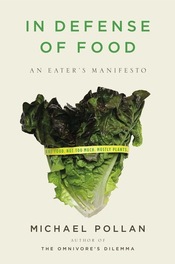I just started reading Michael Pollan’s In Defense of Food. I read The Omnivore’s Dilemma about a year and a half ago and found it very perspective-changing so I am looking forward to what this book will have to say.
The first few chapters have focused on discussion of the ideology behind “nutritionism.” Pollan points out that this is not a scientific term, though there is “food science” that is involved.
Nutritionists and food scientists seem to have an unusual amount of power over the thoughts, perceptions, and actions of the general public. The pervading misconception is that the key to understanding food is to look at the nutrients and break it down in a reductionist manner, or, as Pollan puts it, that “foods are essentially the sum of their nutrient parts.”
This has manifested itself in the excessive amounts of specific and confusing labeling for processed food products in the supermarkets. Things like “omega-3” and “no-trans fat” grace the covers of all kinds of products, but do consumers really understand what they are getting? And is it their fault if they do not?
The industry would have us think that any thing that they sell is “healthy,” ever since the fear of eating unhealthily struck the nation. With things being said to be linked to heart disease and obesity, it is hard to avoid letting that line of thinking slip into our subconscious.
The reality is that the science rarely supports these claims with strong enough evidence to advise any type of change in dietary preferences. The evidence may be suggestive, but the consumer doesn’t pick that up in the translation (which relates to the scientific literacy issue, not enough people understand the process of science).
Pollan describes the history of changes that occurred to bring nutritionism to its current status. One point he makes that I agree with is that the industry has made it a battle between “good” and “bad” nutrients. Somehow, eating certain food items could reduce a “bad” nutrient, or provide a “good” one. Food scientists usually don’t know enough about any one nutrient in a food product to be able to say for certain that it is good or bad, but they can usually say that a type of food is good or detrimental for one’s health.
For instance, it is good for humans to eat a lot of vegetables, but to eat less meat. We’ve known that for ages. That is why we are omnivores. We can say we need the protein, the vitamins, etc. in meat and vegetables, but we really can’t say for sure what else we are getting from eating whole foods. Our knowledge is not yet complete.
One example is the infant milk formula. It still is not perfected, because there are things in natural human milk that we have not been able to find or replicate (antibodies or other things).
We tend to think we know what we need, or that we can trust the professionals to tell us what we need, but that is very naïve of us.
I’m looking forward to reading more of the book! Take a look at it some time to hear more of Pollan’s ideas and I will for sure be posting more entries about it.
Image credit: michaelpollan.com
